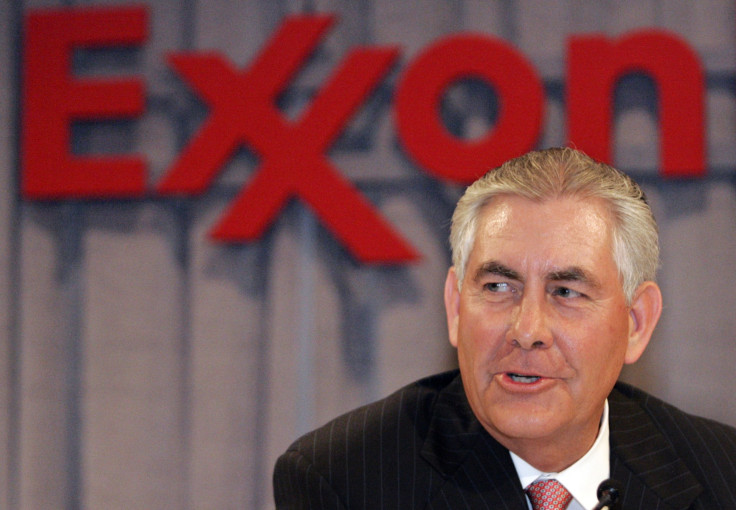Donald Trump And Exxon: CEO Who Could Be Secretary Of State Runs Company That Often Lobbied The State Department

If ExxonMobil’s top executive is appointed to run the State Department, he will be running an agency his company has repeatedly lobbied in recent years.
Under Exxon CEO Rex Tillerson, who is expected to be nominated Donald Trump’s secretary of state, the oil colossus has directly lobbied the State Department on everything from sanctions against Russia and Iran to climate policy to the Trans-Pacific partnership and other controversial trade deals. An IBT review of federal records shows Exxon has been listed as lobbying the State Department on 20 separate government disclosure forms since the beginning of the Obama administration in 2009. The forms list a combined $43 million worth of total Exxon spending on lobbying, though not all of that was spent specifically lobbying the department that Tillerson would run.
Tillerson has mocked investments in renewable energy and has downplayed the effects of climate change. As secretary of state, he would be in a position that has been deeply involved in matters that affect Exxon and other oil and gas corporations. In the last few years, the State Department has forged an international drilling pact, promoted hydraulic fracking across the globe and negotiated climate and trade pacts that shape the fossil fuel economy
In the early years of the Obama administration, lobbying records show that under Tillerson, Exxon lobbied the State Department on legislative proposals dealing with sanctions against Iran. One disclosure from 2010 specified the company’s lobbying on sanctions legislation was about “provisions related to energy investments and sanctions.” The State Department notes that sanctions legislation passed that year “expands significantly the energy-related activities that are sanctionable and adds new types of sanctions that can be imposed.” In 2015, Exxon denied it was lobbying on Iran-related legislation.
In 2011, records detailing Exxon’s State Department lobbying say the company engaged in “discussions related to the Columbia, Panama and Korea Free Trade agreements, and Russia ascension into World Trade Organization.” Exxon boasts of its operations in Russia, which joined the WTO in 2012. In 2014, Exxon also lobbied on proposed U.S. sanctions against Russia’s energy sector. In SEC filings that year, the company said it faced up to $1 billion in potential losses from such sanctions.
Also in 2014, Exxon lobbied the State Department on proposed treaties. One was the U.S. Mexico Transboundary Agreement. According to the agency, the final agreement “will unlock areas for exploration and exploitation” of fossil fuels and make “nearly 1.5 million acres of the Outer Continental Shelf more attractive” to energy companies. Exxon also had "discussions related to Transatlantic Trade and Investment Partnership (TTIP) energy and climate issues."
The company also hired former Sens. Trent Lott and John Breaux to lobby the State Department on proposed ratification of a United Nations pact governing ocean-based oil and gas exploration. The push came as Exxon faced a high-profile international dispute over its drilling off the coast of South America. The Truman National Security Project notes the pact “would guarantee exclusive economic rights to the United States over huge swaths of ocean in the Atlantic and Pacific oceans, as well as the Arctic Sea.” The think tank says “roughly 1.5 million square miles [about the size of the Alaska and Louisiana Purchases combined] would become open for hydrocarbon and mineral exploration by U.S. firms alone.”
The Senate did not ratify the pact, but a renewed push by a Secretary of State Tillerson could reopen the matter.
In the last two years, federal records show Exxon has lobbied the State Department on the proposed Trans-Pacific Partnership — which Trump has said he opposes, but which Tillerson has promoted. In one filing, Exxon said it lobbied specifically on “Investor State Dispute Settlement issues” — a catch-all term for trade provisions that critics say allow corporations to sue governments to overturn environmental, labor and other public interest laws. In the last few years, Exxon has used such provisions to successfully sue Venezuela and Canada.
Though various news organizations have said Trump is about to name Tillerson as his designated secretary of state, the president-elect has not yet announced his official decision. Trump tweeted Sunday no matter his decision, Tillerson "is a world class player and dealmaker. Stay tuned!”
© Copyright IBTimes 2024. All rights reserved.






















